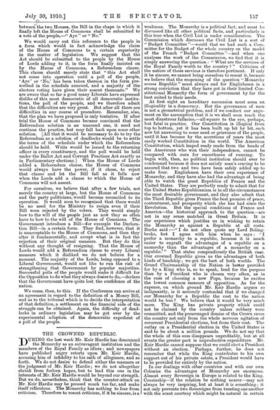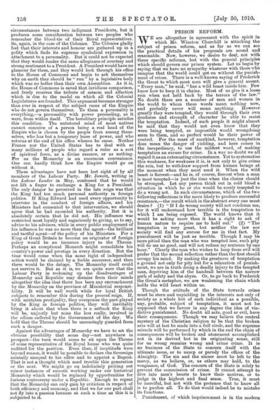THE CROWNED REPUBLIC. D URING the last week Mr. Heir Hardie
has denounced the Monarchy as an extravagant institution and the members of the Royal Family as idlers ; and newspapers have published angry retorts upon Mr. Heir Hardie, accusing him of infidelity to his oath of allegiance, and so forth. We do not desire to defend either the manners or the judgment of Mr. Heir Hardie ; we do not altogether shrink from forlorn hopes, but to lead this one in the interests of.Mr. Keir Hardie would be beyond our strength. But we do, nevertheless, think that the counter-attack on Mr. ICeir Hardie may be pressed much too far, and make itself ridiculous. The Monarchy has nothing to fear from criticism. Therefore to resent criticism, if it be sincere, is a weakness. The Monarchy is a political fact, and must be discussed like all other political facts, and particularly is this true when the Civil List is under consideration. The Commission which discusses the Civil List is a sort of " Budget Committee "—would that we had such a Com- mittee for the Budget of the whole country on the model of the French " Budget Committee "—and when one analyses the work of the Commission, we find that it is simply answering the question : " What are the services of the Royal Family worth to the country ? " Criticism of the nature of those services is therefore pertinent. If only it be sincere, we cannot bring ourselves to resent it, because we believe that the reopening of the question " Monarchy versus Republic " must always end for Englishmen in a. strong conviction that they have got in their limited Con- stitutional Monarchy the form of government by far the best suited to their needs.
At first sight an hereditary succession must seem an illogicality in a democracy. But the governance of men is not a geometrical problem, and if we conduct our argu- ment on the assumption that it is we shall soon reach the most disastrous fallacies,—all-square to the eye, perhaps, but fatal in practice. Our Constitution is illogical from top to bottom, yet it has been built up bit by bit, each new bit answering to some need or grievance of the people, until it has become by the accretions of years the most easily worked Constitution in the world. The American Constitution, which leaped ready made from the heads of the Americans who won their independence, cannot be compared with ours for smoothness of running. To begin with, then, no political institution should ever be condemned because it does not satisfy man's craving to be assured that two and two have been safely added up to make four. Englishmen have their own experience of Monarchy, and they have also had the advantage of being able to watch the great Republics of France and the United States. They are perfectly ready to admit that for the United States Republicanism is in all the circumstances the most desirable government, and they also admit that the Third Republic gives France the best promise of peace, contentment, and prosperity which she has had since the Revolution. But the special conditions of France and America—the historical approach to the question—are not in any sense matched in Great Britain. It is our experience which justifies us in wishing to retain the Monarchy as against a Republic at all costs. Burke said :—" I do not often quote my Lord Boling- broke, but I agree with him when he says : I prefer a monarchy to a republic, because it is much easier to engraft the advantages of a republic on a monarchy than the advantages of a monarchy on a republic.' " That states compendiously the British case. Our crowned Republic gives us the advantages of both kinds of headship we get the best of both worlds. The Grand Chairmanship of the Nation is better provided for by a King who is, so to speak, bred for the purpose than by a President who is chosen very often, as in the case of choosing a new Pope, because he excites the lowest common measure of opposition. As for the expense, on which ground Mr. Heir Hardie argues so indignantly, is it seriously contended that if we changed our Monarchy for a Republic the cost to the nation would. be less ? We believe that it would be very much more. The King has private property which could not be claimed by the country unless robbery were committed, and the prearranged demise of the Crown saves the country not only from the whole nervous agitation of recurrent Presidential elections, but from their cost. The outlay on a Presidential election in the United States is said to be about a million pounds. We do not say that the whole of this sum disappears unprofitably, but at all events the greater part is unproductive expenditure. Mr. Heir Hardie cannot suppose that we could elect a President without an election. Perhaps, further, he does not remember that while the King contributes to his own support out of his private estate, a President would have to be provided for entirely by the nation.
In our dealings with other countries and with our own Colonies the advantages of Monarchy are enormous. Almost every Sovereign in Europe is related to the King. Cousinship—if the relation be nothing nearer—may not always be very inspiring, but at least it is something ; it not only prevents two Sovereigns from treating one another with the scant courtesy which might be natural in certain circumstances between two indignant Presidents, but it produces some consideration between two peoples who remember the blood-tie of their Royal representatives. Bo, again, in the case of the Colonies. The Colonies gladly feel that their interests and.honour are gathered up in a polity which finds its supreme symbolical expression in attachment to a personality. But it could not be expected that they would render the same allegiance of courtesy and strong sentiment to a President. A President would have no glamour for them, and they would look through his office to the House of Commons and begin to ask themselves why on earth they should be " run " by a legislative body which was no better than their own Assemblies. As it is, the House of Commons is saved that invidious comparison, and freely receives the tribute of esteem and affection which is due to the model on which all the Colonial Legislatures are founded. This argument becomes stronger than ever in respect of the subject races of the Empire who do not govern themselves. To them a personality is everything,—a personality with power proceeding, as it were, from within itself. The hereditary principle satisfies this condition. The untutored mind of most natives cannot conceive of a person being a real head of the Empire who is chosen by the people from among them- selves, who has but a temporary lease of power, and who returns at the end of his office whence he came. Neither France nor the United States has to deal with so many millions of people who regard a ruler as a sort of spiritual force, as a divine essence, or as nothing. For us the Monarchy is an enormous convenience. One can hardly think how the Empire would go on without it.
These advantages have not been lost sight of by all members of the Labour Party. Mr. Jowett, writing in the Labour Leader in May, confessed that he would not lift a finger to exchange a King for a President. The only danger he perceived in the late reign was that the King had too much personal authority in foreign politics. If King Edward had used every opportunity to intervene in the conduct of foreign affairs, and his Ministers had consented to that intervention, we should agree that he had exceeded his authority. But it is absolutely certain that he did not. His influence was restricted most loyally and sagaciously to giving, so to say, advice to his advisers, while in every public employment of his influence he was no more than the agent—the brilliant and tactful agent—of the policy of his Ministers. For a King of Great Britain to become an originator of foreign policy would be an immense injury to the Throne. Perhaps an exceptional Monarch might consolidate his country's power and prestige in every direction. But the time would come when the same right of independent action would be claimed by a feeble successor, and then there would be the deluge. The Monarchy itself could not survive it. But as it is, we are quite sure that the Labour Party in reckoning up the disadvantages of Monarchy and Republic may dismiss from their minds altogether the idea that there has been any encroachment by the Monarchy on the province of Ministerial responsi- bility. It will be well worth while for loyal British subjects to remember this during the present reign. If, with mistaken prodigality, they overpraise the part played by the King in foreign politics, they will inevitably bring it about that when there is a setback the King will be, unjustly but none the less really, involved in the odium suffered by the Government of the day. We hold that the Throne should be unceasingly guarded from such a danger. Against the advantages of Monarchy we have to set the obvious possibility that some day—not anywhere in .prospect—the turn would come to sit upon the Throne of some representative of the Royal house who was quite unfitted for the position. Even then, if ineptitude were beyond reason, it would be possible to declare the Sovereign mentally unequal to his office and to appoint a Regent. That is not a.thought which need trouble this generation or the next. We might go on indefinitely picking out minor instances of smooth working under our historical Monarchy which would be replaced by opportunities for furious controversy under a Republic. Enough to repeat that the Monarchy can only gain by criticism in respect of both efficiency and economy, and that we for our part shall not fly into a passion because at such a time as this it is :subjected to it.







































 Previous page
Previous page